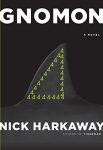Sometimes you must wonder if we’re on the verge of a surveillance state. There’s the NSA (and likely many others) closely watching electronic communications. Cameras intended to monitor traffic flow capture far more than that. Public and private places with camera surveillance are ubiquitous. The concern thus raises for individual privacy is a core of Nick Harkaway’s latest novel, Gnomon.
Harkaway envisions a near-future Great Britain in which an AI, the Witness, has access to total surveillance of the population and all information. It is a key to the System, a permanent direct democracy with ongoing polling and which allows citizens to vote directly on the country’s issues. As a “precautionary principle” to ensure the System keeps society the best it can be, it is occasionally necessary to investigate certain individuals via neurological access to their thoughts and memories. The subjects tend to emerge “happier, more organised and more productive” because the aftercare works like a “tune-up.”
 Now, for the first time, someone died during an examination — Diane Hunter, a nonconformist writer. Mielikki Neith, a die-hard inspector for the Witness, is called on to investigate what happened by accessing the recording of Hunter’s memories. But she discovers four additional personas in Hunter’s mind. They are Constantine, a Greek investment wizard; Athenais, an alchemist and the mother of St. Augustine’s son; Berihun Bekele, an Ethiopian artist who ends up doing the graphic design for the massively multiplayer online game (Witnessed)being created by his granddaughter’s company; and the title character, a future collective consciousness akin to the hive mind of Star Trek’s Borg.
Now, for the first time, someone died during an examination — Diane Hunter, a nonconformist writer. Mielikki Neith, a die-hard inspector for the Witness, is called on to investigate what happened by accessing the recording of Hunter’s memories. But she discovers four additional personas in Hunter’s mind. They are Constantine, a Greek investment wizard; Athenais, an alchemist and the mother of St. Augustine’s son; Berihun Bekele, an Ethiopian artist who ends up doing the graphic design for the massively multiplayer online game (Witnessed)being created by his granddaughter’s company; and the title character, a future collective consciousness akin to the hive mind of Star Trek’s Borg.
As the book’s protagonist, Neith provides a framework police procedural story. Her investigation leads her to wonder if the System she believes in so fervently has an inherent defect or is perhaps even being manipulated. While intertwined with that framework, the other four characters create an esoteric labyrinth of mysticism and arcana somewhat reminiscent of Umberto Eco. Their stories unfold through a multitude of individual discourses as Neith reviews the recordings of Hunter’s interrogation. They are the novel’s ultimate failing.
Many of these chapters are confounding, almost impenetrable. They even occasionally take us into Hell and outside time. Several, especially Athenais’s, refer to so many mythological figures and ideas — with some early Christian history and symbolism thrown in — a reader is well-advised to have some sort of reference work handy. Harkaway’s word choices also call for reference material. He seems to prefer the obscure (“novacula, ”saccades,” ”pursuivants,” “apocatastasis”) over the straightforward.
Finally, many of these discourses are too lengthy and digressive. Gnomon clocks in at 700 pages. Granted, the story is complex, but it would have benefited greatly had several hundred pages been eliminated. As a result, I’m guessing a significant number of readers who start the book will not see it through to completion.
The universe has cancer.
Nick Harkaway,Gnomon







